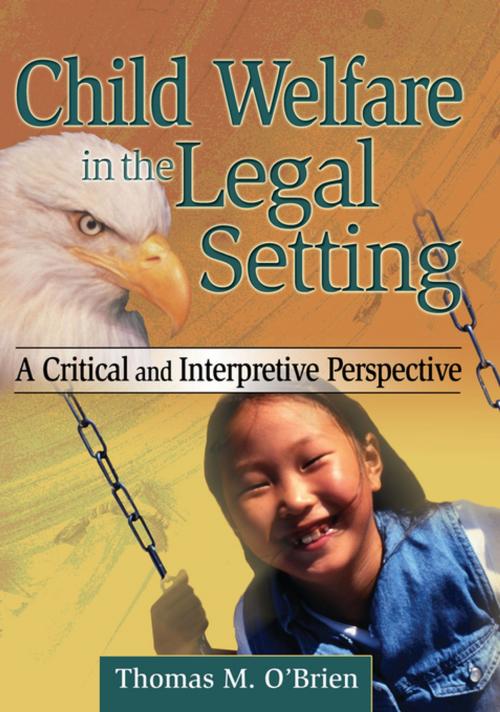Child Welfare in the Legal Setting
A Critical and Interpretive Perspective
Nonfiction, Health & Well Being, Medical, Patient Care, Health Care Delivery, Allied Health Services, Reference & Language, Law| Author: | Thomas M O'Brien | ISBN: | 9781136374876 |
| Publisher: | Taylor and Francis | Publication: | April 3, 2013 |
| Imprint: | Routledge | Language: | English |
| Author: | Thomas M O'Brien |
| ISBN: | 9781136374876 |
| Publisher: | Taylor and Francis |
| Publication: | April 3, 2013 |
| Imprint: | Routledge |
| Language: | English |
Explore legal issues that often hinder the work of child welfare practitioners!
Child Welfare in the Legal Setting: A Critical and Interpretive Perspective is a revolutionary study of the child welfare system that is essential for practitioners, educators, and students interested in public child welfare work. It examines the legal system surrounding child welfare workers and highlights their need for agency-specific training. This insightful book challenges the traditional rules of child welfare and paves the way for alternate methods of conceptualizing and organizing child protection. It explores why many family interventions fail and others never even occur. By identifying incongruities between the philosophy of child welfare and its function, this book advocates a more individualistic and efficient technique for assisting clients. Addressing issues and challenges from the initial identification of problems to navigating the legal system, this book is also thorough enough for public child welfare workers who want to take their skills to the next level.
The large-system perspective in this book uses the concentric circle model, the rational legal model of legal and court action, and the ritualized process model to examine child welfare practice. Learn why terms such as child abuse and neglect have become social constructions that vary depending on the values of social workers, judges, attorneys, agencies, and communities. Child Welfare in the Legal Setting: A Critical and Interpretive Perspective examines the standardization of the organizational activities of child welfare systems and how this limits professionals’ ability to accurately recognize unique problems and intervene in the most beneficial manner.
Child Welfare in the Legal Setting also provides controversial opinions on emerging issues including:
- family investigations
- sanction for Child Protective Services intervention
- the legal setting as a host environment
- the function of the child welfare system
- rationalization of child welfare intervention
- trained incapacity of social workers
- Title IVE programs
- the court system
Child Welfare in the Legal Setting: A Critical and Interpretive Perspective identifies vital issues by analyzing the ethical and moral foundations of the child welfare system. This insightful book also takes a close look at how practitioners inadvertently devalue their clients by using language that creates stigmatized social categories such as victim and convicted felon. Supervisors, managers, social workers and child welfare practitioners will benefit from this information. The vignettes that supplement the narrative also make the book an important resource in any child welfare course.
Explore legal issues that often hinder the work of child welfare practitioners!
Child Welfare in the Legal Setting: A Critical and Interpretive Perspective is a revolutionary study of the child welfare system that is essential for practitioners, educators, and students interested in public child welfare work. It examines the legal system surrounding child welfare workers and highlights their need for agency-specific training. This insightful book challenges the traditional rules of child welfare and paves the way for alternate methods of conceptualizing and organizing child protection. It explores why many family interventions fail and others never even occur. By identifying incongruities between the philosophy of child welfare and its function, this book advocates a more individualistic and efficient technique for assisting clients. Addressing issues and challenges from the initial identification of problems to navigating the legal system, this book is also thorough enough for public child welfare workers who want to take their skills to the next level.
The large-system perspective in this book uses the concentric circle model, the rational legal model of legal and court action, and the ritualized process model to examine child welfare practice. Learn why terms such as child abuse and neglect have become social constructions that vary depending on the values of social workers, judges, attorneys, agencies, and communities. Child Welfare in the Legal Setting: A Critical and Interpretive Perspective examines the standardization of the organizational activities of child welfare systems and how this limits professionals’ ability to accurately recognize unique problems and intervene in the most beneficial manner.
Child Welfare in the Legal Setting also provides controversial opinions on emerging issues including:
- family investigations
- sanction for Child Protective Services intervention
- the legal setting as a host environment
- the function of the child welfare system
- rationalization of child welfare intervention
- trained incapacity of social workers
- Title IVE programs
- the court system
Child Welfare in the Legal Setting: A Critical and Interpretive Perspective identifies vital issues by analyzing the ethical and moral foundations of the child welfare system. This insightful book also takes a close look at how practitioners inadvertently devalue their clients by using language that creates stigmatized social categories such as victim and convicted felon. Supervisors, managers, social workers and child welfare practitioners will benefit from this information. The vignettes that supplement the narrative also make the book an important resource in any child welfare course.















